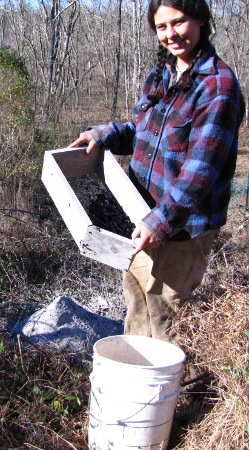
Easy biochar
 Some
of my experiments fade away while others stand the test of time and
become part of our daily routine. Biochar falls into the latter
category.
Some
of my experiments fade away while others stand the test of time and
become part of our daily routine. Biochar falls into the latter
category.
We haven't gotten around
to making large amounts of biochar, but it's simple to sift
charcoal out of the ashes from our wood stove whenever the ash bucket
fills up (once or twice a month.) Come spring, I'll soak
the charcoal in urine to give it a dose of nitrogen, then add it to my soil.
This past growing
season, I discovered that biochar
gave early spring onion seedlings a leg up, probably due to absorbing
sunlight and heating the soil. The real benefits of biochar,
though, will show up later when microorganisms move into their "condos."
For more information on
biochar, check out some of my previous posts. First, videos from
the experts:
Next, my research and
experiments with bringing biochar to the backyard:
- Backyard biochar resources
- Biochar chemistry and biology
- Do I need to crush biochar?
- How to activate biochar
- How to apply biochar to your garden
I'm always looking for
the permaculture low hanging fruit, and I'd put my biochar system on
that list. If you heat with wood, don't toss those hunks of
charcoal! Put them to work in your garden.
Want more in-depth information? Browse through our books.
Or explore more posts by date or by subject.
About us: Anna Hess and Mark Hamilton spent over a decade living self-sufficiently in the mountains of Virginia before moving north to start over from scratch in the foothills of Ohio. They've experimented with permaculture, no-till gardening, trailersteading, home-based microbusinesses and much more, writing about their adventures in both blogs and books.
Want to be notified when new comments are posted on this page? Click on the RSS button after you add a comment to subscribe to the comment feed, or simply check the box beside "email replies to me" while writing your comment.

Dave --- Nope, still no use for the ash. In the far past, I've used it a time or two to dust potato leaves to deter flea beetles, but I don't really think flea beetles are that big of a deal on anything except eggplants anymore. (I think they never were a big deal in my garden --- I just assumed if there were bad bugs around, you should squash them.)
If you've got acidic soil, you can use ash to raise the pH, like lime (but with a dose of micronutrients). But our soil is already quite sweet because of the limestone underneath. So I've just been dumping the ash in a pile and letting it wash into the soil in an area I don't care about.
Roland mentioned some chemistry with ash, such as making lye.